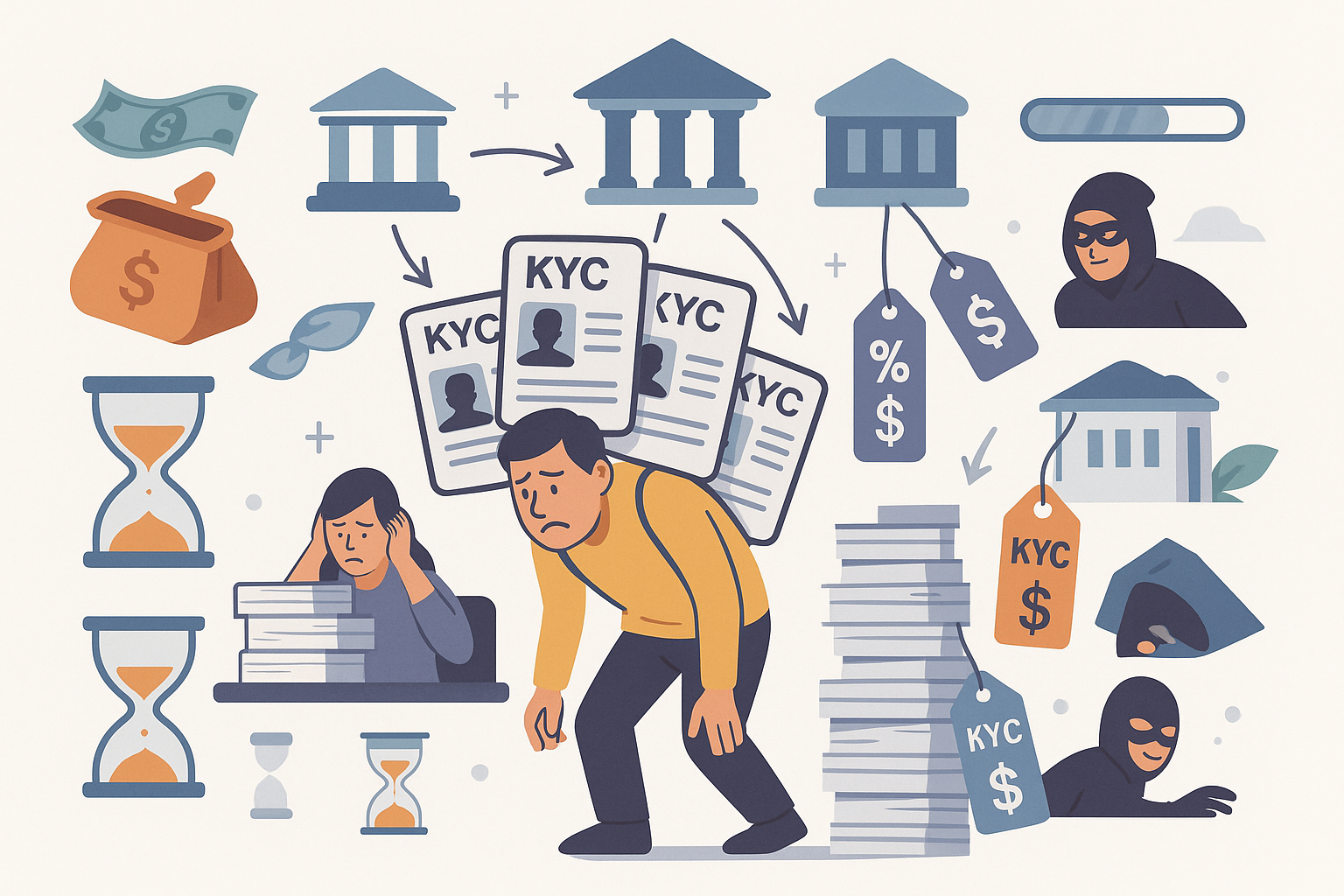Banks and fintechs spend a huge amount of time and money on KYC checks. Every new account, loan, or payment service requires another round of identity verification. For customers, this means filling out the same forms again and again. For financial institutions, it means higher costs, longer onboarding times, and more room for mistakes.
Fraud makes the problem worse. Fake documents, stolen identities, and synthetic profiles slip through traditional checks. Even when fraud is detected, the process is slow and costly to fix.
This is where Self-Sovereign Identity (SSI) comes in. By using verifiable credentials, SSI gives people control over their digital identity and lets banks verify information instantly. Instead of repeating KYC checks, banks can rely on trusted credentials that are secure and reusable.
Why is KYC so costly and repetitive in banking and fintech?
KYC was designed to protect banks from money laundering, fraud, and illegal activity. But the process has become one of the most expensive parts of compliance.
Every customer must go through document checks, identity verification, and background screening. These steps are repeated whenever someone applies for a new product or uses a different financial institution. The result is wasted effort on both sides.
For banks, the cost is steep. Industry reports show that large banks spend billions of dollars each year on KYC and compliance teams. Smaller fintechs feel the burden too, with onboarding delays that slow down growth.
For customers, the process is frustrating. Uploading the same ID documents multiple times creates friction. Long verification times often lead to dropped applications, especially in digital-first onboarding.
And even with all these checks, fraud still happens. Fake documents, stolen credentials, and identity theft often slip through manual reviews. The cycle of high cost, repeated checks, and ongoing fraud risk shows why the current system isn’t sustainable.
What is SSI KYC and how does it work?
Self-Sovereign Identity, or SSI, is a new way to manage digital identity. Instead of storing personal data in a central database, SSI lets people keep their own verified information in a secure digital wallet.
When used for KYC, SSI changes the flow of verification. A trusted authority like a government agency or bank issues a verifiable credential. That credential is stored by the customer and can be shared with any other institution that needs to check their identity.
The difference is that the credential is cryptographically signed. This means the bank receiving it can instantly confirm that the data is real and untampered. No need to ask the customer to upload the same passport or proof of address again.
For example, once a customer has been verified at Bank A, they can reuse that same credential to open an account at Bank B. The process is faster, more secure, and avoids repeating the same KYC steps over and over.
How does SSI reduce fraud in digital onboarding?
Fraud often slips through traditional KYC because documents can be forged, stolen, or altered. Manual checks are not foolproof, and automated systems still rely on copies of IDs that can be faked.
SSI tackles this problem differently. With verifiable credentials, the data comes directly from the original issuer such as a government agency or a regulated bank. Because the credential is digitally signed, it cannot be changed without breaking the signature. That makes tampering nearly impossible.
Another risk in digital onboarding is identity theft. Criminals use stolen documents to open accounts in someone else’s name. SSI reduces this risk because the person must control their own digital wallet. If they don’t have access to it, they cannot present the credential.
Synthetic identities are another growing threat. These are fake profiles built from bits of real and false data. Since SSI credentials must come from trusted issuers, synthetic profiles don’t pass verification.
The result is stronger protection for banks and fintechs, with less dependence on repeated manual checks. Customers get a safer onboarding process, while institutions cut losses from fraud.
Why do banks and fintechs struggle with repeated KYC checks?
One of the biggest frustrations in financial services is the need to verify the same customer multiple times. A client might complete onboarding with one bank product, only to repeat the entire process when applying for a loan, credit card, or digital wallet. This happens because customer data is stored in isolated silos. Each business unit, or even each partner institution, requires a fresh KYC to meet compliance requirements.
The result is wasted time, high costs, and friction that discourages customers. For example, research shows that repeated KYC checks can increase onboarding costs by up to 30%, while also extending processing times by weeks.
With traditional systems, data cannot move seamlessly across institutions without raising concerns over privacy and liability. Regulators demand that KYC data be kept secure, but banks have no way of proving the authenticity of credentials once shared. This forces duplication.
Self-Sovereign Identity (SSI) changes this dynamic. Instead of repeating verification, customers present verifiable credentials, digitally signed proofs of identity that can be instantly checked against the issuer. Banks save effort, regulators get stronger compliance evidence, and customers enjoy a single, reusable identity for multiple services.
Benefits for compliance heads and fintech CTOs
For compliance officers, SSI offers a clear advantage: better evidence of due diligence. Every credential is cryptographically signed by a trusted issuer. This means auditors and regulators can verify the source of customer data without manual back-and-forth. Instead of storing copies of sensitive documents, banks only keep proofs, reducing exposure to breaches.
For fintech CTOs, the gain is in efficiency and integration. Traditional KYC systems are heavy, expensive, and difficult to scale across products. SSI enables API-driven verification that plugs into existing systems. This cuts down onboarding times and lowers infrastructure costs.
Both groups also benefit from privacy-by-design. Customers remain in control of their data, which reduces liability for the institution. If a regulator asks for proof of compliance, the bank can show a secure, timestamped record of verification without holding unnecessary personal data.
In short, SSI simplifies compliance, lowers operational costs, and reduces risk. Compliance heads sleep easier knowing every KYC check is verifiable. CTOs can focus on scaling products instead of managing document-heavy processes. And the customer gets a faster, smoother journey across multiple services.
Why SSI matters for the future of finance
Banks and fintechs spend heavily on KYC while still struggling with fraud and repeat checks. Self-Sovereign Identity offers a practical way forward. By using verifiable credentials, institutions can trust customer data without storing endless documents. Compliance becomes easier, onboarding faster, and fraud harder to commit.
For compliance heads, it means stronger oversight. For CTOs, it means leaner systems. And for customers, it means a smoother journey. SSI is not just theory, it’s the next step in secure digital finance.
Fill the inquiry form to book a free demo with us.

 11th September, 2025
11th September, 2025 



